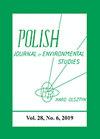Reckonings of Environmental Efficiency and Convergence in Asian-Pacific Region: A Malmquist- Luenberger Approach
IF 1.3
4区 环境科学与生态学
Q4 ENVIRONMENTAL SCIENCES
引用次数: 0
Abstract
The second wave of industrialization at the end of the last century brought the attention of researchers to the effect of more energy usage and its effects on environmental degradation. It was also highlighted in the 2030 agenda for sustainable development goals (2015) that environmental degradation threatens humans’ well-being unless countries use environment-friendly production processes. The present study has used the Malmquist-Luenberger Index (MLI) to estimate the environmental efficiency of the Asia-Pacific (APAC) region for the period 1990 to 2019. The estimated results showed that the environmental efficiency of APAC countries declined by 0.36%, on average, in the studied period. The results also highlighted that the Republic of Korea has the highest total factor productivity (TFP) output growth rate in the APAC region. In contrast, Lao People’s DR and the Maldives have the lowest TFP. Conditional, unconditional, and Club convergence tests are also tested for the APAC region. The results also suggested that convergence in environmental efficiency is conditional on trade openness, industrial growth, and energy prices. Some policies are also suggested for the APAC region at the end of the study.亚太地区环境效率与趋同的计算:马尔奎斯特-卢恩贝格尔方法
上世纪末的第二次工业化浪潮使研究人员开始关注更多能源的使用及其对环境退化的影响。2030 年可持续发展目标议程》(2015 年)也强调,除非各国采用环境友好型生产工艺,否则环境退化将威胁人类福祉。本研究使用马尔基斯特-伦伯格指数(MLI)来估算亚太地区 1990 年至 2019 年的环境效率。估算结果显示,亚太地区国家的环境效率在研究期间平均下降了 0.36%。结果还显示,大韩民国的全要素生产率(TFP)产出增长率在亚太地区最高。相比之下,老挝人民民主共和国和马尔代夫的全要素生产率最低。还对亚太地区进行了有条件、无条件和俱乐部趋同测试。结果还表明,环境效率的趋同取决于贸易开放度、工业增长和能源价格。研究最后还为亚太地区提出了一些政策建议。
本文章由计算机程序翻译,如有差异,请以英文原文为准。
求助全文
约1分钟内获得全文
求助全文
来源期刊

Polish Journal of Environmental Studies
环境科学-环境科学
CiteScore
3.10
自引率
11.10%
发文量
430
审稿时长
4 months
期刊介绍:
One of the most important challenges facing the contemporary scientific world are problems connected with environmental protection. Intensive development of industry and agriculture has led to a rise in living standards on one hand, but an increase in environmental degradation on the other. This degradation poses a direct threat to human health and life. Solving these ever-increasing problems which seriously endanger our civilization require the united efforts of scientists and field researchers of many branches.
The "Polish Journal of Environmental Studies" publishes original papers and critical reviews on the following subjects:
-Basic and applied environmental pollution research, including environmental engineering
-Pollution control of atmospheric, water (marine and fresh), soil and biological materials
-Determination of harmful substances, including their metabolic breakdown patterns
-Analytical methods for metabolic breakdown patterns or other chemical degradation patterns in the environment and in biological samples
-Development of new analytical methods, instruments and techniques for controlling pollutants
-Circulation of pollutants in the environment and their effect on living organisms
-Environmentally oriented catalysis
-Hazards to human health and safety
-Waste utilization and management
-Land reclamation
-Conference reports, scientific and technical reports and book reviews
 求助内容:
求助内容: 应助结果提醒方式:
应助结果提醒方式:


